Organizers and partners of RMA 2019
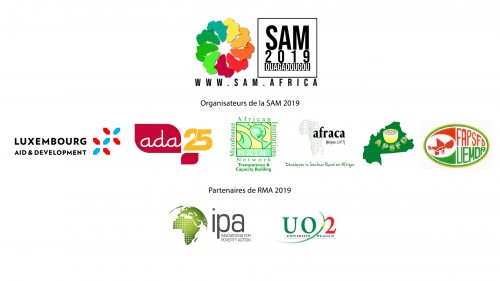
The Research Meets Africa conference aims to promote research and innovation in the field of inclusive finance in Africa by connecting researchers from African and international universities with practitioners in the sector.
This event is open to participants of the SAM 2019 and to students, professors, researchers and professionals in microfinance and financial inclusion, interested in the topic of achieving of Sustainable Development Goals (SDGs).
Download the researchers' articles
Download the researchers' PPT presentations
Download the PPT presentations of the speakers
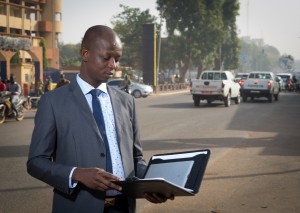
The theme of African Microfinance Week 2019 (SAM) is the impact and contribution of inclusive finance to the Sustainable Development Goals (SDGs).
As a research event, Research Meets Africa 2019 (RMA 2019) can contribute to the reflection on different aspects of the theme, in particular on three main axes:
- What methods should be used to assess the impact and contribution of inclusive finance to the SDGs?
- What impacts and contributions to the SDGs has inclusive finance demonstrated in Africa?
- How to maximize the impact of inclusive finance in Africa?
Thus, on each of the main axes identified, the research presented and discussed may focus in particular on the following topics:
What methods should be used to assess the impact and contribution of inclusive finance to the SDGs?
- What existing tools are available for practitioners to assess the impact and contribution to the SDGs?
- Quantitative methods vs. qualitative methods
- Innovative methods to measure the impact and contribution to the SDGs
- Balance between rigour and operationality
What impacts and contributions to the SDGs has inclusive finance demonstrated in Africa?
- What impacts (positive and negative) does inclusive finance have on the community (beyond clients)?
- What are the impacts (positive and negative) of digital finance?
- What are the impacts of green microfinance on climate change resilience and the environment?
- What are the impacts of microinsurance?
- What are the impacts of alternative modes of SME financing (crowdfunding, equity, quasi-equity, etc.)?
How to maximize the impact of inclusive finance in Africa?
- In which circumstances/context does inclusive finance have the most positive impact?
- Does regulation have a role to play in maximizing impact?
- Does the presence of professional associations or networks promote a positive impact?
- Does a financial education strategy maximize impact?
- Are there any particular products/services/modalities that have a greater positive impact than others?
- Do non-financial services complementary to financial services maximize impact?
Meeting with...
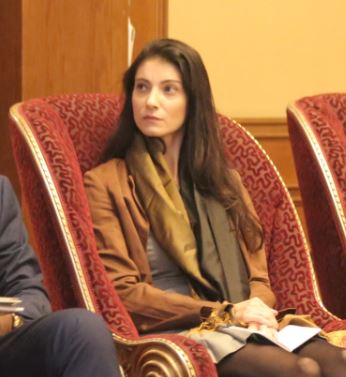
Lucia Spaggiari, Business Development Manager at MicroFinanza Rating, was a panelist at the last edition of Research Meets Africa in Ethiopia in October 2017. She shares with us her feelings about the program.
What do you think about the concept/format of Research Meets Africa?
Research Meets Africa is a unique opportunity for researchers and practitioners in inclusive finance to speak together. Both sides pursue valuable goals, but their language, priorities and needs do not necessarily match. Deliberate efforts are needed to make the match happen, and Research meets Africa is one effective way of encouraging this.
Why did you choose to participate in this event?
I chose to participate in this event because I share the vision that research and practice can enormously learn from each other. The financial inclusion sector can greatly benefit from qualified research to reinforce the feedback loop between the double bottom line expectations and results. Similarly, the value and impact of research on prosperity, people and planet can be further enhanced through a better match with practitioners concerns and opportunities.
How did participating in this event benefit you?
I learnt a lot from the event. The contributions offered interesting updates and debates on both the research conducted and the priorities of financial service providers, investors, regulators, practitioners and other stakeholders. The debate on interest rate caps from a regulatory and practitioner perspective was very informative.
Did you make interesting contacts during or thanks to this event?
I was indeed able to make interesting contacts (e.g. Mrs Alexis Beggs Olsen, author of Uniting Tech and Touch, ACCION, 2017) that allowed very fruitful conversations after the event.
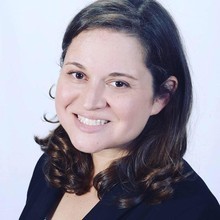
Rebecca Rouse, Director, Financial Inclusion at Innovations for Poverty Action (IPA), tell us the benefits she got from the last SAM in Ehiopia in 2017 and why she decided to renew the IPA partnership for the next SAM in Ouagadougou.
What do you think about the concept/format of Research Meets Africa?
I appreciate the emphasis that this event gives to pairing research presentations with practitioner discussion; in order to effectively translate evidence to practice, it is essential to create these sorts of opportunities for the academic community and financial service providers to speak directly to each other about how lessons can be applied to the real world challenges that providers and policymakers face every day.
What benefit did you draw from this event? Did you make interesting contacts during or after the event?
RMA provides an excellent opportunity to network with researchers and academics from the region, as well as with industry leaders who have a demonstrated interest in applying an evidence-based approach to their work in the financial services space. I appreciated the ability to hear new work from local researchers from a range of institutions including the Central Bank of Burundi, the National Institute for Legislative Studies in Nigeria, and Protestant University of Congo in the DRC.
Why did you choose to repeat the partnership with ADA for this event?
Innovations for Poverty Action has a two-pronged mission: first, to produce high quality evidence on the effectiveness of programs and policies which help the poor, and second, to ensure that decision-makers use and apply this evidence by making it useful and accessible. We chose to continue our partnership with ADA for RMA 2019 because we believe that this event will help us to fulfill our mission by providing a platform not only for IPA to share its work with other researchers and local practitioners and policymakers, but also to engage in thoughtful discussions with these stakeholders about the translation of this evidence into practice.
Download the research papers of Research Meets Africa 2017
Partner for the conference
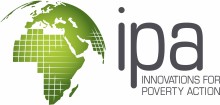 Innovations for Poverty Action (IPA) is a research and policy nonprofit organization that discovers and promotes effective solutions to global poverty problems. IPA brings together researchers and decision-makers to design, rigorously evaluate, and refine these solutions and their applications, ensuring that the evidence created is used to improve the lives of the world’s poor. Since our founding in 2002, IPA has worked with over 600 leading academics to conduct over 830 evaluations in 51 countries. This research has informed hundreds of successful programs that now impact millions of individuals worldwide.
Innovations for Poverty Action (IPA) is a research and policy nonprofit organization that discovers and promotes effective solutions to global poverty problems. IPA brings together researchers and decision-makers to design, rigorously evaluate, and refine these solutions and their applications, ensuring that the evidence created is used to improve the lives of the world’s poor. Since our founding in 2002, IPA has worked with over 600 leading academics to conduct over 830 evaluations in 51 countries. This research has informed hundreds of successful programs that now impact millions of individuals worldwide.

